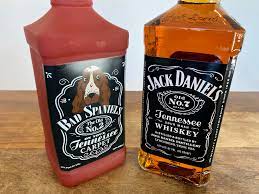Jack Daniel’s Wins Trademark Battle with ‘Bad Spaniels’ Dog Toy Maker
On Thursday, the Supreme Court gave Jack Daniel’s whiskey manufacturers cause to celebrate by giving them a second opportunity to prevail in their trademark fight with the makers of the Bad Spaniels dog toy.
Justice Elena Kagan was in an unusually lighthearted mood as she announced the verdict for a unanimous court. Kagan held up the toy, which squeaks and imitates the whiskey’s distinctive bottle, at one point while reading a summary of the ruling in the courtroom.
Kagan argued that the logic used by a lower court to support the manufacturers of the rubber chew toy was erroneous. The court remanded the case for more examination rather than making a ruling on whether the creator of the toy had violated trademark law.
In a court judgment, Kagan said, “This case is about dog toys and whiskey, two items that rarely appear in the same sentence.” Kagan also included a color image of the bottle before asking readers to “Recall what the bottle looks like (or better yet, retrieve a bottle from wherever you keep liquor; it’s probably there)”.
Since 2014, VIP Products, located in Arizona, has been marketing its Bad Spaniels toy. It is a component of the business’s Silly Squeakers collection of chew toys that look like beer, soda, liquor, and wine bottles. They consist of Heini Sniff’n, a mock Heineken beer, and Mountain Drool, a parody of Mountain Dew.
While the labels on Jack Daniel’s bottles say “Old No. 7 brand” and “Tennessee Sour Mash Whiskey,” the plaything says, “The Old No. 2 on Your Tennessee Carpet.” Its 40% alcohol by volume content is noted on the original bottle. A dog’s face is shown in the spoof, which declares that it is “43% Poo by Vol.” and “100% Smelly.”
The $20 retail toy’s box states in tiny print: “This product is not affiliated with Jack Daniel Distillery.”
Lynchburg, Tennessee-based Jack Daniel’s wasn’t amused. According to company attorneys, the toy deceives consumers, capitalizes on “Jack Daniel’s hard-earned goodwill,” and links its whiskey to “excrement.”
The Lanham Act, the primary federal trademark legislation of the nation, is at the heart of the dispute. Use of a trademark that is “likely to cause confusion… as to the origin, sponsorship, or approval of… goods” is prohibited.
However, a lower court never addressed the problem of consumer confusion because it determined that the toy was a “expressive work” that conveyed a funny message and so required to be assessed under a different standard. That was an error, according to Kagan, and “the only question in this case going forward is whether the Bad Spaniels marks are likely to cause confusion.”
In addition, Kagan argued that a previous court misinterpreted Jack Daniel’s argument that the toy maker had linked “its whiskey to less savory substances.”
The court released four opinions on Thursday, one of which was a 5-4 decision in favor of Black voters in Alabama in a dispute involving congressional redistricting. The case was keenly followed because it had the potential to damage the historic Voting Rights Act.
Jack Daniel’s Properties, Inc. v. VIP Products LLC, 22-148, is the case at hand.







